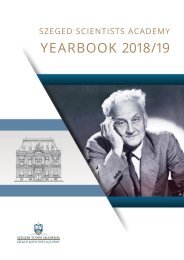SzSA YearBook 2016/17
Create successful ePaper yourself
Turn your PDF publications into a flip-book with our unique Google optimized e-Paper software.
SZENT-GYÖRGYI MENTORS<br />
SZABOLCS KÉRI<br />
Department of Physiology,<br />
University of Szeged<br />
Address: Dóm tér 10., H-6720 Szeged, Hungary<br />
E: keri.szabolcs.gyula@med.u-szeged.hu<br />
T: +36 62/545 101<br />
RESEARCH AREA<br />
Understanding the basic mechanisms of psychiatric disorders<br />
(schizophrenia, depression, posttraumatic reactions)<br />
is an ultimate challenge for sciences, humanities, and<br />
arts. Our team is dedicated to the delineation of the meeting-point<br />
of these traditionally remote areas of exploration<br />
and discovery, using the tools of neurosciences and psychology.<br />
Beyond the clinical symptoms, we pay an outstanding attention<br />
to the basic cognitive building blocks of psychiatric<br />
disorders (e.g., dysfunctions of perception, attention, and<br />
memory), their neurobiological background, and finally we<br />
seek the link between these fundamental functions and<br />
higher human phenomena (e.g., the impact of psychological<br />
trauma, the relationship among psychotherapy, healing,<br />
and creativity).<br />
What is the relationship between the pathophysiology of<br />
perception and memory and the symptom clusters of hallucinations<br />
and delusions? Why are these symptoms more<br />
common in immigrants and refugees? What is the role of<br />
psychological trauma? What kind of structural and functional<br />
brain plasticity can be found behind the response to<br />
psychotherapy? Is there any chance to find a relationship<br />
between these changes and the molecular mechanisms?<br />
Where is the boundary between medical sciences and humanities?<br />
The research team works at three centers in a strong collaborative<br />
network with several psychiatric units: in addition<br />
to the Department of Physiology at the medical faculty of<br />
the University of Szeged, the network includes the National<br />
Institute for Psychiatry and Addictions, and the Department<br />
of Cognitive Science of Budapest University of Technology<br />
and Economics.<br />
TECHNIQUES AVAILABLE IN THE LAB<br />
Clinical interview and rating scales, narrative deep interview,<br />
administration and development of neuropsychological tests<br />
(SuperCard and E-Prime programming environments), eyetracking,<br />
EEG, structural brain measurements with magnetic<br />
resonance imaging (MRI), development and clinical validation<br />
of biochip technologies.<br />
SELECTED PUBLICATIONS<br />
Szily, E., Kéri, Sz. (2013) Delusion proneness and emotion<br />
appraisal in individuals with high psychosis vulnerability.<br />
Clin Psychol Psychother 20: 166-70.<br />
Levy-Gigi, E., Kéri, Sz. (2012) Falling out of time: enhanced<br />
memory for scenes presented at behaviorally irrelevant<br />
points in time in posttraumatic stress disorder (PTSD). PLoS<br />
One 7: e42502.<br />
Kéri, Sz. (2011) Solitary minds and social capital: Latent<br />
inhibition, general intellectual functions and social network<br />
size predict creative achievements. Psychol Aesthet Creat<br />
Arts 5: 215-221.<br />
Kéri, Sz., Moustafa, A.A., Myers, C.E., Benedek, G., Gluck, M.A.<br />
(2010) Alpha-Synuclein gene duplication impairs reward<br />
learning. Proc Natl Acad Sci USA 107: 15992-4.<br />
Kéri, Sz., Beniczky, S., Kelemen, O. (2010) Suppression of the<br />
P50 evoked response and neuregulin 1-induced AKT phosphorylation<br />
in first-episode schizophrenia. Am J Psychiatry<br />
167: 444-50.<br />
57












